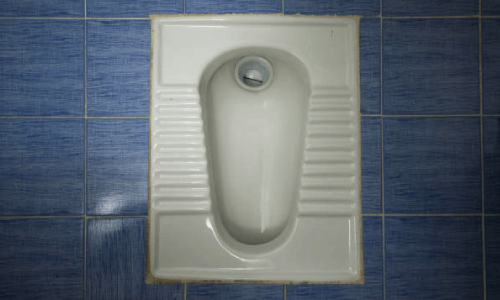In Ayurveda, the concepts of bowel movement and digestive health is deeply intertwined with overall well-being. While Ayurveda doesn’t specifically address the use of Indian squat toilets, it does emphasize the importance of maintaining proper posture and lifestyle habits to support healthy digestion and elimination. The squatting position adopted in Indian squat toilets is believed to align the rectum more effectively and reduce the risk of constipation and other digestive issues. From an Ayurvedic perspective, this alignment can help facilitate the smooth passage of stool by optimizing the natural anatomical position of the body during defecation. Ayurveda also emphasizes the importance of regular bowel movements in eliminating toxins (Ama) from the body and maintaining optimal health. Maintaining balance in the Doshas, which are central to Ayurvedic philosophy, considers proper elimination essential. While Ayurveda does not explicitly prescribe the use of squatting toilets, it does offer recommendations for promoting healthy digestion and elimination. These recommendations include adopting a balanced diet rich in fiber and fluids, engaging in regular physical activity to stimulate digestion, and cultivating mindfulness and relaxation techniques to reduce stress and promote overall well-being. Why the Indian squat toilet is the best? Here are 7 reasons why Indian squat toilets are the best. Easy bowel movement When you squat, your wide thigh positioning helps the muscles and nerves in the area eliminate the waste quickly. This wider stance can facilitate the relaxation of the pelvic floor muscles and the opening of the anal sphincter. It thus makes it easier for stool to pass through the rectum and out of the body. The squatting position also straightens the anorectal angle, which can create a more efficient pathway for waste elimination compared to sitting on a toilet seat. This alignment can reduce the need for straining during bowel movements and may help prevent issues such as constipation and hemorrhoids. Relaxes anal sphincter muscles While using a squat toilet, your muscles around the rectum relax and open up the sphincter naturally in a squatting position. This relaxation occurs because the squatting position straightens the anorectal angle, allowing for a more natural alignment of the intestines. As a result, the muscles and nerves in the pelvic floor region are better able to release tension, facilitating the passage of stool with less effort. The straightening of the anorectal angle also reduces the need for straining during bowel movements. This can help prevent issues such as constipation, hemorrhoids, and other bowel-related discomforts. Minimises the tendency of faecal impaction When squatting, the angle of the rectum straightens, allowing for a more effective and complete evacuation of stool. This reduces the likelihood of residual stool remaining in the rectum and becoming impacted. In contrast, sitting on a toilet seat may not provide the same level of straightening of the anorectal angle. This can contribute to incomplete emptying of the bowels and the accumulation of stool in the rectum over time. Faecal impaction can lead to discomfort, pain, and further complications if left untreated. By promoting a more natural alignment of the digestive tract and facilitating the easier passage of stool, squatting can help prevent fecal impaction and support overall digestive health. This is particularly beneficial for individuals who experience chronic constipation or have difficulty with bowel movements. Minimises strain on hemorrhoids Hemorrhoids are swollen and inflamed veins in the rectum and anus that cause discomfort, pain, and bleeding, especially during bowel movements. When you use a squat toilet, the anorectal angle straightens, which can reduce the need for straining during defecation. This decreased strain is beneficial for individuals with hemorrhoids because it helps minimize pressure on the affected veins, reducing irritation and discomfort. Squatting can also promote a complete evacuation of stool. This can prevent the exacerbation of hemorrhoids caused by straining or incomplete emptying of the bowels. By adopting a squatting position, individuals with hemorrhoids can experience less discomfort and irritation during bowel movements. This allows for a smoother and more comfortable elimination. Straightening of anorectal angle When you use a squat toilet, the anorectal angle straightens. This creates a more natural alignment of the rectum and allowing for smoother passage of stool. The alignment reduces the need for straining during bowel movements. It also helps to prevent issues such as constipation and fecal impaction. In contrast, sitting on a toilet seat can maintain the anorectal angle in a bent position. This may hinder the evacuation process and lead to difficulties in passing stool. Squatting encourages the muscles around the rectum to relax, which further facilitates the emptying of the bowels. By promoting a more efficient evacuation, squatting can contribute to improved digestive health and reduce the risk of complications such as hemorrhoids and faecal impaction. This is why squatting is often advocated as a more natural and effective posture for bowel movements. Hygiene Squat toilet is more hygienic as there is no contact of buttocks on the seat. This reduces the risk of exposure to harmful bacteria or germs on the toilet seat surface. In many cultures where squat toilets are commonly used, individuals prefer this method for its perceived cleanliness. By squatting above the toilet rather than sitting on it, there is minimal contact with the toilet seat. This can help maintain personal hygiene and reduce the risk of infections or transmission of pathogens. For individuals who prioritize hygiene and cleanliness, squatting can be a preferred option for using the toilet. It minimizes direct contact with potentially contaminated surfaces and promotes a sense of cleanliness and comfort. Best morning workout Using the Indian squat toilets also give some morning workouts to your glutes, quads, hamstrings and calves! Ayurveda gives utmost importance to gut health. In fact, a poor gut health is the root cause of all diseases. So if you have a health condition, it is better to consult an Ayurvedic doctor and have your… Continue reading Why Squat Toilets are the Best for Your Digestive Health?
Why Squat Toilets are the Best for Your Digestive Health?

